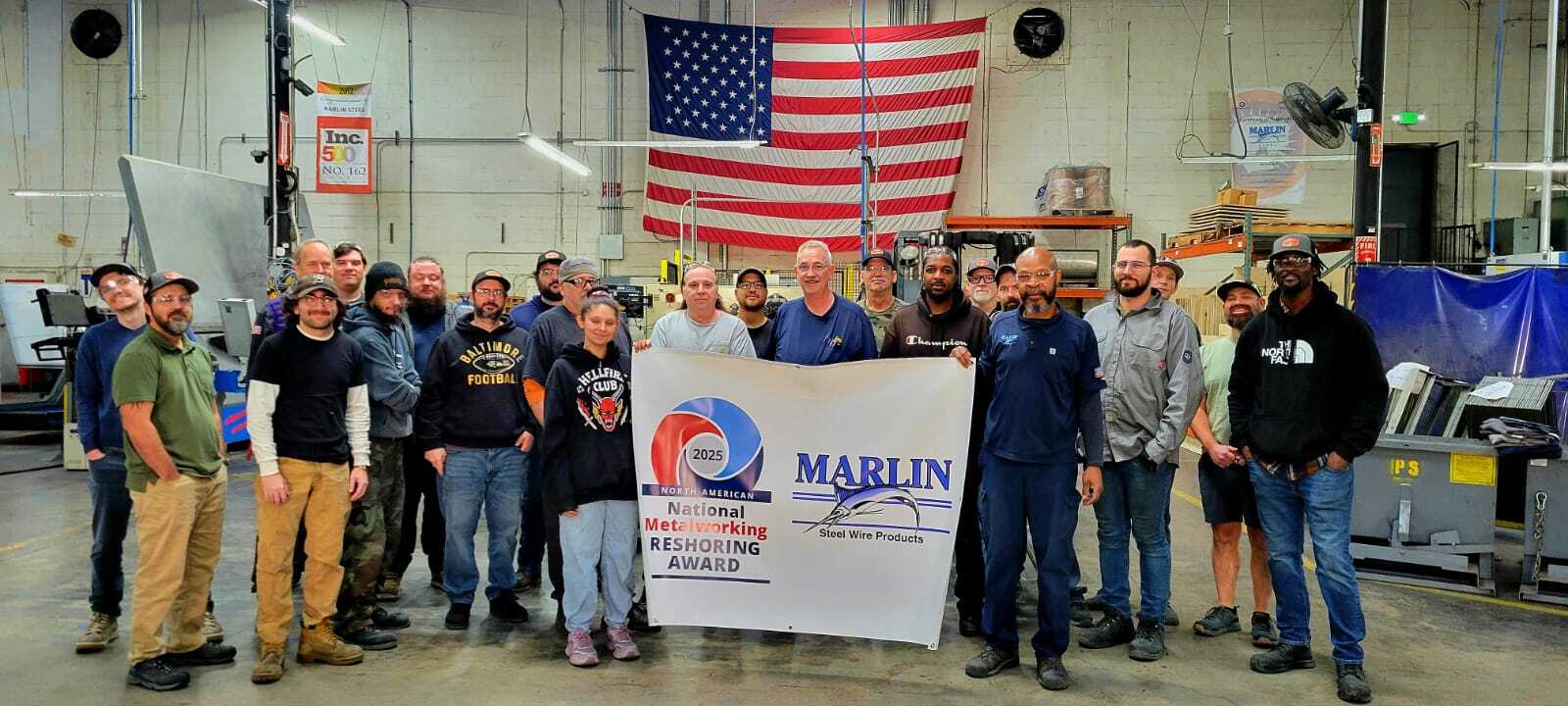Marlin Steel is once again in the spotlight, this time featured in a new case study from UpSkill America at the Aspen Institute. The study, Investing in People Is an Investment in the Business, showcases how Marlin Steel’s commitment to its workforce has fueled remarkable growth and industry recognition.

From Bagel Baskets to Reshoring Leader
When Drew Greenblatt purchased Marlin Steel in 1998, it was a small Baltimore shop with fewer than 20 employees making wire baskets for bagel shops. Fast forward to today, Marlin operates across three plants with over 130 employees, serving industries like aerospace, automotive, and food processing.
By shifting from commodity products to custom-engineered solutions and investing heavily in automation, Marlin achieved a 35x increase in sales. This strategy helped the company withstand overseas competition and earned them the 2025 National Metalworking Reshoring Award in Chicago.
Pay-for-Skills: A Culture of Growth
At the heart of Marlin’s success is a unique pay-for-skills model. Employees start at $20.25 per hour, but each new machine they master earns them additional pay, with no cap on training opportunities.
Training includes vendor-led instruction, on-site coaching, and testing to validate mastery. This transparent system gives employees control of their career paths and earning potential, while building a highly adaptable workforce.
A Workplace Built on Curiosity and Community
The case study highlights how Marlin Steel fosters a culture of curiosity and support:
- Employees are encouraged to ask questions, experiment, and take on new responsibilities.
- A referral program rewards current employees with $4,000 bonuses spread over a year, motivating mentorship and improving retention.
- The company invests in its communities through events, school partnerships, and economic development initiatives.
These practices don’t just grow skills, they transform lives. Stories in the case study detail employees who advanced from entry-level roles to technical positions, and even one employee who, after being released from the justice system, was trained to operate advanced machinery and sent for vendor instruction across the country.
Drew Greenblatt: Marlin Steel started off with a factory in Baltimore, Maryland. and we made bagel baskets for 30 years. And then an engineer at Boeing asked if we could make a custom basket. is an epiphany. Now, we can make anything with wire, anything with sheet metal. And in the last four years, the company has almost more than tripled in size. We have locations now in Indiana and Michigan.
The general trend is that people are moving from rural America to big urban cities. And that's why I love building in these small towns because you're part of the future of the community. And success begets success. It's fabulous. The parts look great. Our strategy with employees is to treat them really well.
Hello, guys. How's it going today?
So when we started in Baltimore, everybody was paid top-notch wages. We pay them well and we share the wealth.
Hi, Penny. Hi. And it's an exciting approach to making this community stronger. The wires, do they spin in smooth?
Penny: Yes, they do. Production is a lot better with this. Thank you, Penny.
Rachel Marsh: Drew's put a lot into the company. It's not just him going up and saying, 'Well, how's that part running?'
Hi, Mike.
We really try to make sure that the community understands that we're there for them. I'm feet on the ground here, and I can see how we can help out.
Hey, Deb.
Drew Greenblatt: We're trying to lift people. You're knocking out of the park with learning all the different elements of this business. and give them avenues to grow and thrive in this rural community.
Rachel Marsh: I grew up in Bronson, Michigan, born and raised. Hey, bud. Hi.
Coming home from a factory job, my father always said, 'I hope you kids don't grow up working in a factory like me.'
I never want somebody to feel like you felt. I always remember you coming home from work upset, and I always want to make sure I never have employees going home feeling like you did so unhappy, but willing to work for his family and do anything he can.
I am going to cry. Oh my God.
Drew has always made it known that the communities matter most out of everything. That's how you make a great company even better.
Drew Greenblatt: Allison. Hello. How are you? How's your family?
My great-grandmother came over on the boat and she was a seamstress in Philadelphia. We check all the components before we put it together. My grandfather started a grocery shop in Philadelphia, and he saved up enough money to help send my dad to college.
And how's the new job working out? Are you happy? You enjoying it? I love it. I absolutely love it. I absolutely love it. I absolutely love it.
My dad worked hard, and my dad taught me how to invest. And what other things can we do to help you out? And we're investing in people. and they're creating opportunities for their kids and their families. It's not just about the profits.
I want to help people like somebody helped out that seamstress in 1914 get a job in Philadelphia. It's about pulling up people, making this community stronger.
Why It Matters
Marlin Steel’s story illustrates how investing in people creates both business and personal wins. By linking skills to pay, prioritizing community engagement, and maintaining a culture of curiosity, the company has built a workforce that is resilient, loyal, and adaptable.
The Aspen Institute sums it up well: Marlin Steel offers a roadmap for other manufacturers, defines the skills that matter, provides structured training pathways, rewards learning, and creates a culture of trust.




.gif)


